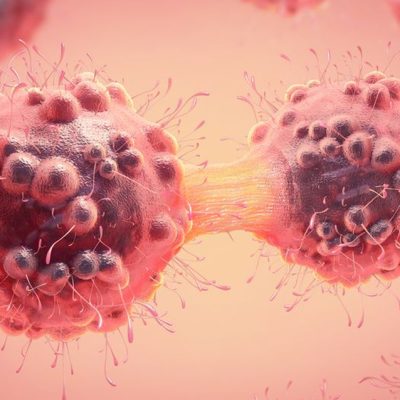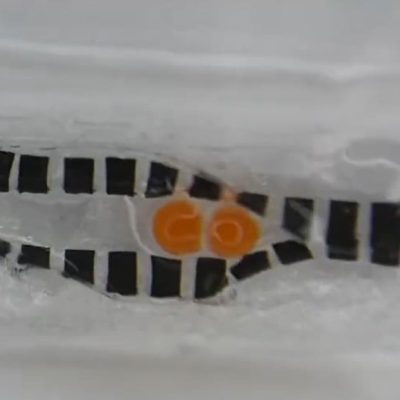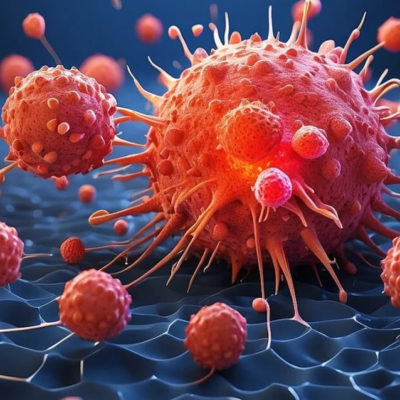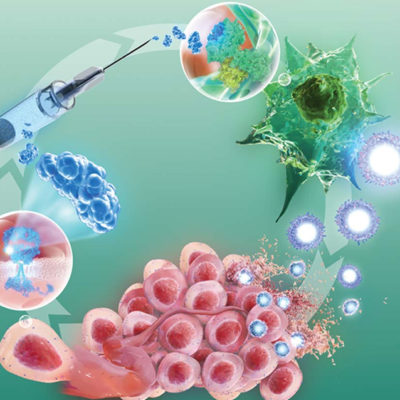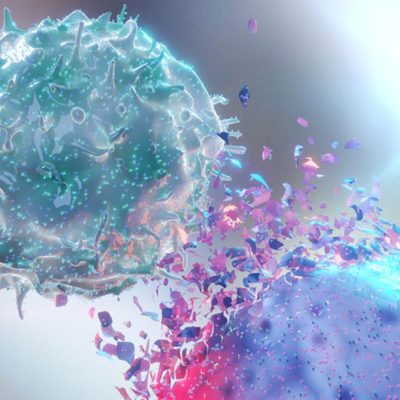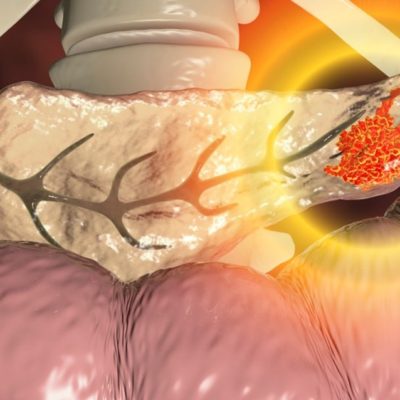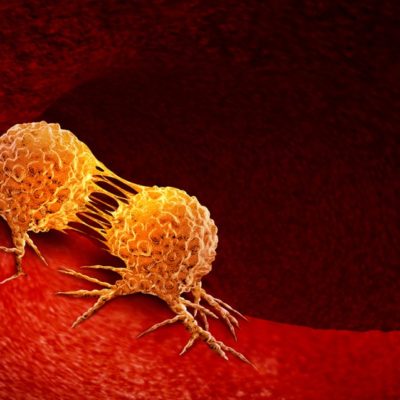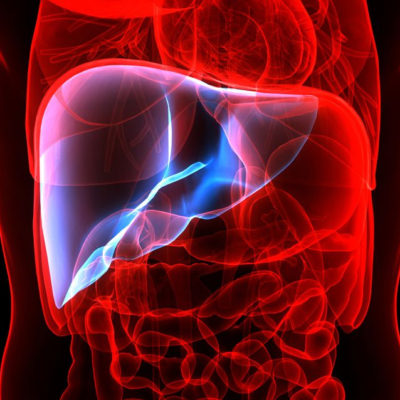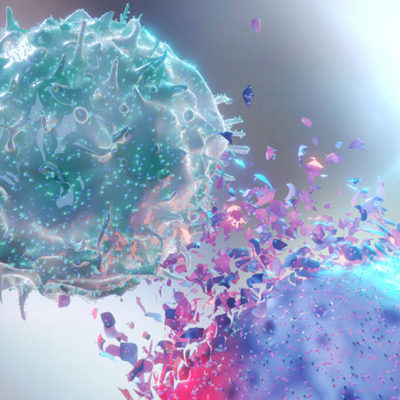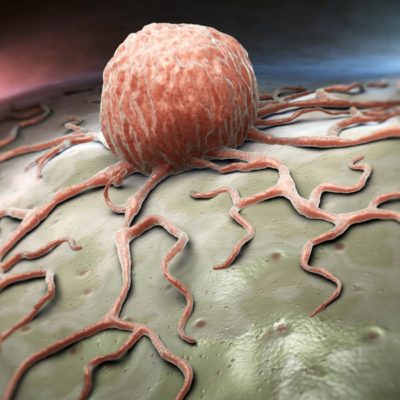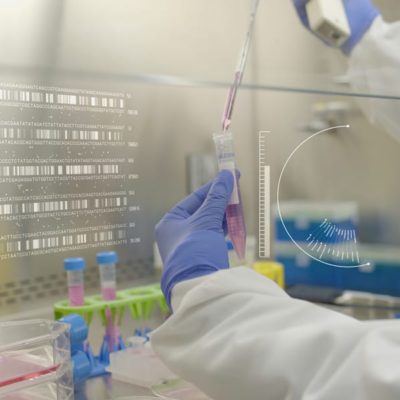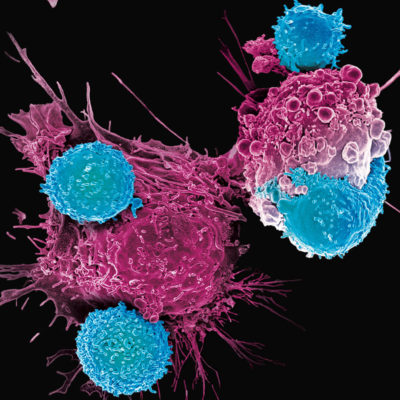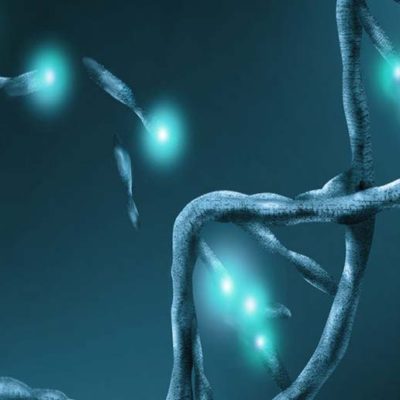A new approach to treating the most malignant type of brain cancer -- glioblastoma -- has shown strong promise in pre-clinical settings, raising hopes of increasing current average survival rates beyond 18 months. Targeted alpha therapy (TAT) is emerging as a potential additional treatment for glioblastoma (GB), a disease which has confounded oncologists for decades due to … [Read more...]
Cancer News

Robotic Device Restores Wavelike Muscular Function Involved in Processes Like Digestion
A team of Vanderbilt researchers has developed a wirelessly activated device that mimics the wavelike muscular function in the esophagus and small intestine responsible for transporting food and viscous fluids for digestion. The soft-robotic prototype, which is driven by strong magnets controlled by a wearable external actuator, can aid patients suffering from blockages … [Read more...]
Pan-Cancer Analysis Uncovers a New Class of Promising CAR T-Cell Immunotherapy Targets
Targeting anti-cancer therapy to affect cancer cells but not healthy cells is challenging. For chimeric antigen receptor (CAR) T-cell immunotherapy, where a patient's own immune cells are re-engineered to attack cancer cells, many solid and brain cancers lack an effective target. St. Jude Children's Research Hospital scientists have identified 156 potential targets through a … [Read more...]
Beating By Overheating: New Strategy to Combat Cancer
To treat cancer, you have to inhibit cancer cells. Right? Researchers at the Netherlands Cancer Institute did just the opposite. They achieved surprising results by overstimulating cancer cells in the lab and then hitting them at their weak spot: stress. "This goes against the prevailing view." Many new drugs inhibit the processes that cancer cells need to divide rapidly. So … [Read more...]
Non-Invasive Techniques to Detect Skin Cancer
A study conducted by Aston University researchers has demonstrated that the appearance of ageing skin looks noticeably different compared to younger skin, when examined under polarised laser light. The scientists believe that their new finding could pave the way for new, non-invasive light-based techniques to detect diseases, including cancer, in older individuals. This … [Read more...]
Why Cancer Immunotherapies don’t Work for Everyone
Why cancer immunotherapies don't work for everyone (cancer) The study, published in the peer-reviewed journal Cell Reports, sheds light on why immunotherapy treatments don't work for all people or all diseases. For example, certain types of cancers -- including colon, pancreatic, prostate and brain cancers -- have stubbornly resisted immunotherapy. And while breast, … [Read more...]
Artificial Intelligence and Immunity
Researchers from Cleveland Clinic and IBM have published a strategy for identifying new targets for immunotherapy through artificial intelligence (AI). This is the first peer-reviewed publication from the two organizations' Discovery Accelerator partnership, designed to advance research in healthcare and life sciences. The team worked together to develop supervised and … [Read more...]
Trial Show Treatment Designed to Clear Senescent Cells in Alzheimer’s Disease is Safe
Alzheimer's disease is the most common cause of dementia that affects more than 6.5 million Americans, according to the Alzheimer's Association. To find effective treatments and slow the progression of this debilitating disease, researchers have made much progress in developing new drugs that target beta-amyloid plaques, one of the hallmarks of Alzheimer's … [Read more...]
Plants Remove Cancer Causing Toxins From Air
A ground-breaking study has revealed that plants can efficiently remove toxic gasoline fumes, including cancer causing compounds such as benzene, from indoor air. The study was led by University of Technology Sydney (UTS) bioremediation researcher Associate Professor Fraser Torpy, in partnership with leading Australian plantscaping solutions company Ambius. The … [Read more...]
Discovery of Metabolic Switch Could Lead to Targeted Treatment of Obesity, Cancer
An Iowa State University research team has discovered a method for modifying the function of an enzyme crucial to fat production, which could lead to more effective treatments for childhood obesity and cancer. While the research was in fruit fly larvae, being able to speed up or slow down lipid metabolism could have significant implications for human health, said Hua Bai, … [Read more...]
Dietary Change Starves Cancer Cells, Overcoming Treatment Resistance
Cancer cells need nutrients to survive and grow. One of the most important nutrient sensing molecules in a cell is called mTORC1. Often called a master regulator of cell growth, it allows cells to sense different nutrients and thereby grow and proliferate. When nutrients are limited, cells dial down nutrient sensing cascade and turn off mTORC1. While mTORC1 is known to be … [Read more...]
Biological Pathways Provide Evidence For How to Overcome Barriers Limiting Cancer Immunotherapies
Researchers at UNC Lineberger Comprehensive Cancer Center have found a possible way to overcome barriers that block effective anti-cancer immune responses, thereby opening the potential for more effective immunotherapies in people. The findings are published in Nature. An unfavorable immune environment immediately surrounding a tumor cell is a major obstacle in using … [Read more...]
Researchers Find Tumor Microbiome Interactions may Identify New Approaches for Pancreatic Cancer Treatment
Investigators from Rutgers Cancer Institute of New Jersey, the state's leading cancer center and only National Cancer Institute-Designated Comprehensive Cancer Center, together with RWJBarnabas Health, examined the microbiome of pancreatic tumors and identified particular microorganisms at single cell resolution that are associated with inflammation and with poor survival. … [Read more...]
Scientists are One Step Closer to Stopping Drug-Resistant Tumors From Growing
Scientists have solved a long-standing mystery surrounding a cancer-promoting protein and how it causes tumor growth. The findings are an important step in the quest to make cancer drugs more effective since aggressive tumors often become adept at resisting drugs and other therapeutic agents. The recent discovery by a team of scientists including Benjamin Myers, PhD, an … [Read more...]
Leisure Time Activities may Lower Risk of Death for Older Adults
Older adults who participate weekly in many different types of leisure time activities, such as walking for exercise, jogging, swimming laps, or playing tennis, may have a lower risk of death from any cause, as well as death from cardiovascular disease and cancer, according to a new study led by researchers at the National Cancer Institute, part of the National Institutes of … [Read more...]
Scientists Discover Key to Hepatitis A virus Replication, Show Drug Effectiveness
The viral replication cycle is crucial for a virus to spread inside the body and cause disease. Focusing on that cycle in the hepatitis A virus (HAV), UNC School of Medicine scientists discovered that replication requires specific interactions between the human protein ZCCHC14 and a group of enzymes called TENT4 poly(A) polymerases. They also found that the oral compound RG7834 … [Read more...]
How Immunotherapy Changes Tumors
Johns Hopkins University engineers are the first to use a non-invasive optical probe to understand the complex changes in tumors after immunotherapy, a treatment that harnesses the immune system to fight cancer. Their method combines detailed mapping of the biochemical composition of tumors with machine learning. "Immunotherapy really works like magic and has fundamentally … [Read more...]
Scientists identify new therapeutic target in ovarian cancer subtype with poor prognosis
Mutations in the ARID1A gene are present in more than 50% of ovarian clear cell carcinomas (OCCC), for which effective treatments are lacking. Scientists at The Wistar Institute discovered that loss of ARID1A function enhances a cellular stress response pathway that promotes survival of cancer cells, which become sensitive to pharmacological inhibition of this pathway. These … [Read more...]
Japanese Knotweed extract could cut cancer risk of processed meat
Bacon could be back on the menu of health-conscious diners thanks to an unlikely salvation: Japanese knotweed. The fast-growing plant, feared by homeowners for its ability to invade gardens and buildings, contains a chemical which could take the place of the nitrite preservative in cured meats such as bacon and sausages. Diets high in nitrite have been linked to a … [Read more...]
Potential role of ‘junk DNA’ Sequence in Aging, Cancer
The human body is essentially made up of trillions of living cells. It ages as its cells age, which happens when those cells eventually stop replicating and dividing. Scientists have long known that genes influence how cells age and how long humans live, but how that works exactly remains unclear. Findings from a new study led by researchers at Washington State University have … [Read more...]
Parkinson’s, Cancer, Type 2 Diabetes Share a Key Element That Drives Disease
When cells are stressed, chemical alarms go off, setting in motion a flurry of activity that protects the cell's most important players. During the rush, a protein called Parkin hurries to protect the mitochondria, the power stations that generate energy for the cell. Now Salk researchers have discovered a direct link between a master sensor of cell stress and Parkin itself. … [Read more...]
Artificial Intelligence Could ‘Crack The Language of Cancer and Alzheimer’s’
Powerful algorithms used by Netflix, Amazon and Facebook can 'predict' the biological language of cancer and neurodegenerative diseases like Alzheimer's, scientists have found. Big data produced during decades of research was fed into a computer language model to see if artificial intelligence can make more advanced discoveries than humans. Academics based at St John's … [Read more...]
Bacteria may Aid Anti-Cancer Immune Response
Cancer immunotherapy may get a boost from an unexpected direction: bacteria residing within tumor cells. In a new study published in Nature, researchers at the Weizmann Institute of Science and their collaborators have discovered that the immune system "sees" these bacteria and shown they can be harnessed to provoke an immune reaction against the tumor. The study may also help … [Read more...]
Future of Immunotherapy could be ‘off-the-shelf’ treatments
In a new commentary for the journal Science, an associate vice president for research at The University of Texas at Arlington argues that emerging protein-based immunotherapy could lead to highly effective "off-the-shelf" cancer treatments for more patients. Jon Weidanz, who also is a professor in the College of Nursing and Health Innovation at UTA, is the author of a … [Read more...]
Deep Vision: Near-infrared imaging and machine learning can identify hidden tumors
Tumors can be damaging to surrounding blood vessels and tissues even if they're benign. If they're malignant, they're aggressive and sneaky, and often irrevocably damaging. In the latter case, early detection is key to treatment and recovery. But such detection can sometimes require advanced imaging technology, beyond what is available commercially today. For instance, some … [Read more...]
Injection to treat skin cancer developed
Yale researchers are developing a skin cancer treatment that involves injecting nanoparticles into the tumor, killing cancer cells with a two-pronged approach, as a potential alternative to surgery. The results are published in the Proceedings of the National Academy of Sciences. "For a lot of patients, treating skin cancer is much more involved than it would be if there … [Read more...]
Technology shines the light on ovarian cancer treatments
Scientists estimate that nearly 60% of all cancer patients do not respond effectively to chemotherapy treatments. Even worse -- many of those same patients experience toxic and sometimes deadly side effects. Now, a Purdue University scientist and entrepreneur is working to use simple LED light to help determine if certain chemotherapy options will work for specific … [Read more...]
Targeted Drug found Effective in Patients who have Lung Cancer with Certain Mutations
A targeted therapy called capmatinib can provide significant benefits to patients who have advanced lung cancer with specific gene mutations, according to recently published results from a phase two clinical trial. The trial, which is published in the New England Journal of Medicine, was conducted by an international team led by investigators at Massachusetts General Hospital … [Read more...]
Researcher seeks safer, more effective leukemia treatment
A potentially safer, more effective chemotherapy treatment for patients with blood-related cancers, such as leukemia, who need a particular bone marrow transplant procedure is under study at the University of Arizona Health Sciences. The procedure is known as a haploidentical (half-matched) bone marrow transplantation, or "haplo-BMT," providng an alternative source of stem … [Read more...]
Brake on immune activity identified, raising new possibilities for anticancer therapy
The immune system is like a carefully regulated machine, complete with its own built-in "brakes" that prevent it from overreacting and causing excess inflammation in otherwise healthy tissues. This preventative safety net, however, is highly vulnerable, particularly in cancer, where tumor cells step on the brakes constantly, because doing so allows the tumor cells to … [Read more...]
- 1
- 2
- 3
- …
- 37
- Next Page »
